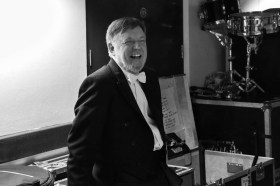I have a secret love for Buddy Holly and the Crickets. At least once a month, generally after hearing “It doesn’t matter any more” or “True love ways,” I become emotional like Oprah Winfrey’s guests, snuffling vigorously to avoid the ugly streaking of leaky mascara. I wonder how the world would have been different if that plane had not crashed, or if he had decided to travel on the tour bus. With all the focus on Buddy, the fog and the flight, we forget and undermine the innovation to instrumentation, rhythm and harmony of his great band, the Crickets.
A three piece is sparse and economical, beckoning instrumental innovation through a frugal melody or lilting syncopation. Joe B. Mauldin slapped a stand up bass and J.I. Allison’s drumming filled out the extremities of a track. Three piece bands expand the sonic landscape in innovative ways. The Police built a reggae cadence with Andy Summer’s Telecaster soaring above Sting’s understated bass line. Johnny Cash developed the boom-chicka-boom-chicka rhythm through his early collaboration with the Tennessee Two, sans drummer. Cream and the Jimi Hendrix Experience could allow two of the greatest lead guitarists in rock music to showcase their virtuosity rather than being muddied in the mix. The Thompson Twins were dominated by percussion instruments, weaving melody around the intricate rhythms of ‘Hold me now.’ The Jam sutured thrash, mod style and political rage through Paul Weller’s staccato flagellation of his strings.
The innovations of the three piece band have been underwritten through musical history. With all the attention on 1960s rock and the default lineup of two guitarists, a bass guitarist and a drummer, the subtle distinctions of a three piece have been marginalized from influence. We have become so accustomed to the configurations of The Beatles and The Rolling Stones that more frugal ways of managing sound have been under-represented. Too often the risks of the three piece band are absorbed into the fleshed out sound of rock’s default instrumentation.
There has not been an equivalent to The Crickets, until now. In October last year, I attended what I hoped would be one of the greatest gigs of my life: seeing the Scissor Sisters in Brighton. Their legendary show at the Brighton Dome was saved for posterity on DVD. Performing live again in the gay capital of the United Kingdom, much was promised.
Perhaps predictably in response to the hype, the Scissor Sisters were mediocre on that night, held back by their fans. Now that they are part of stadium rock, the radical edge of “Take your Mama” has become a sing-along affirming the importance of spending quality time with our parents. It was good performance. It was not great.
Even though the Scissorhood was a drag rather than in drag, it was the opening act that changed my life. I had heard rumbles about a three piece from the United States called Gossip. They happened to be booked for the Sisters’ support slot. Out walked a five foot, fifteen stone lesbian in a seriously stretchy green dress. She wore enormous stilettos and enough eyeliner to satisfy the most hardcore Cure fans. In a queer reinscription of the Crickets, Beth Ditto is a lesbian feminist Buddy Holly. This is quite an image, but unerringly accurate.
Emerged from this startling green frock was a transcendental voice, summoning fifty years of soul divas, the best of Motown and the anguish of the blues. She was Aretha Franklin, Janis Joplin, Sandy Denny, Patti Smith and Yoko Ono in one body. She had Aretha’s range, Janis’s rage and Yoko’s scream. She was terrific. Even better, she “played” her stilettos. In a sparse and percussive three piece, she slammed her stilts hard into the floorboards in time to the music. The thump resonated through the auditorium. While Buddy Holly played (off) his glasses, Beth Ditto played her shoes.
Within days, The Guardian newspaper was calling her “The Next Big Thing” and putting her on the cover of their magazine. The NME named her the “coolest rock star on the planet”. Both these headlines are understatements. She is changing how we think about women, bodies and voices. Beth Ditto is the new normal.
Gossip is punk-pop and pop-punk. They howl and shout. Most importantly they ask questions about what it means to be in love, to be lost or to change. While the Scissor Sisters helped us party through the Iraq War, Gossip will be the soundtrack for the retribution and rehabilitation that follows.
Significantly, and like the Crickets, Gossip works the spaces between the notes and through the instruments. Like Holly, Ditto stands out in a crowd and dominates the band. If there is a diametrically opposite point to Victoria Beckham in popular culture, then Ditto lives there.
Against the odds in an era where thin women are only matched by thinner ideas, Ditto is fashionable. Resisting the leggings and jumper combination that is meant to block big bodies from the offending gaze of skinny sensibilities, she wears tight dresses, swimsuits and enormous shoes.
Gossip’s guitarist Brace Paine has the Holly capacity to move smoothly from an innovative riff to a lead break. Hannah Blilie continues the pounding tradition of female drummers and J.I. Allison’s capacity to puff out a track with rhythm.
The single that lead to their popular cultural breakthrough was “Standing in the way of control”. Written in opposition to the Bush government’s decision to deny gay men and women the right to marriage, it has become a wider anthem against indifference. The importance of resistance, amidst banal television and YouTube executions, has never been more important. Ditto’s voice is so clear and Gossip’s sound so crisp and punchy that they are the Pied Pipers to our political future. Howling the rage and hammering for change, Gossip stand in the way of stupidity.




